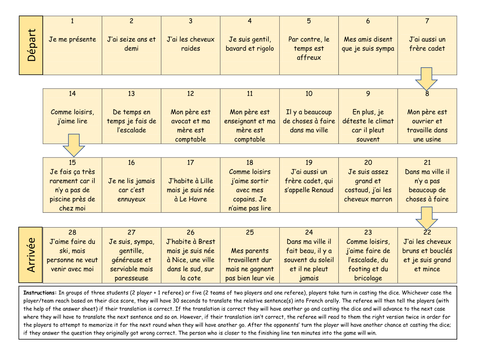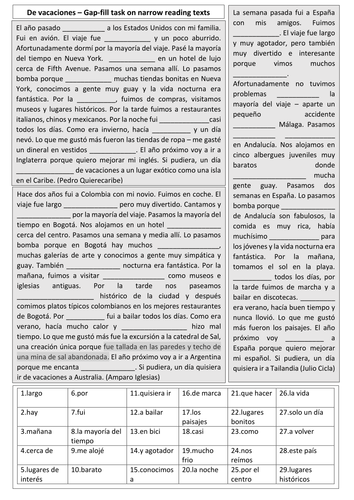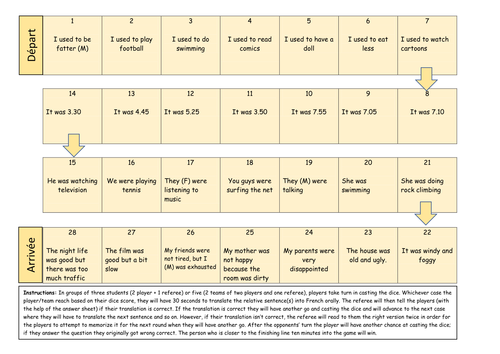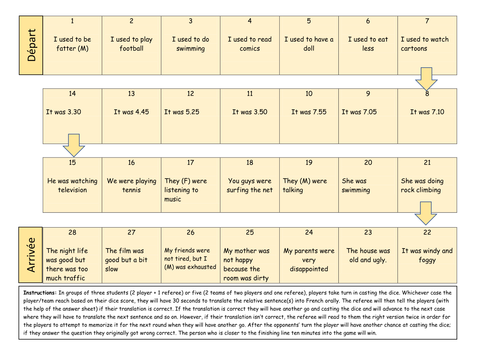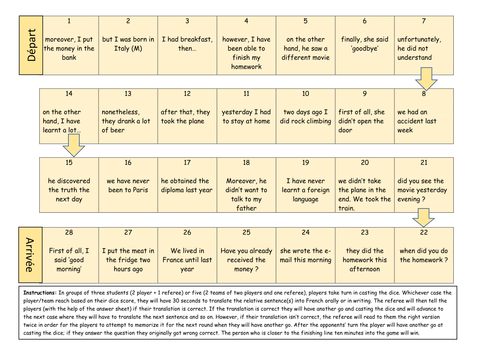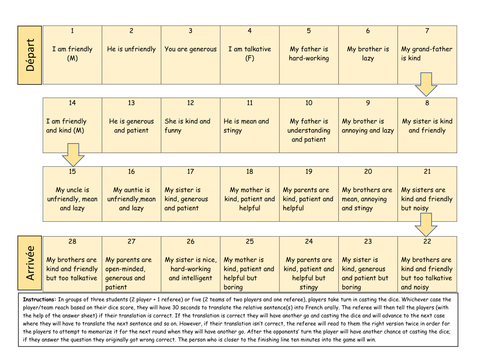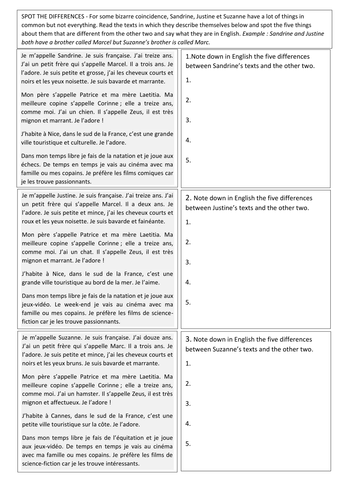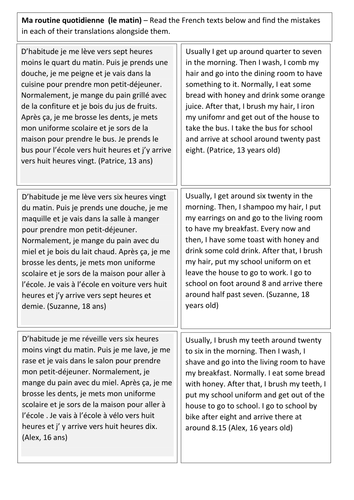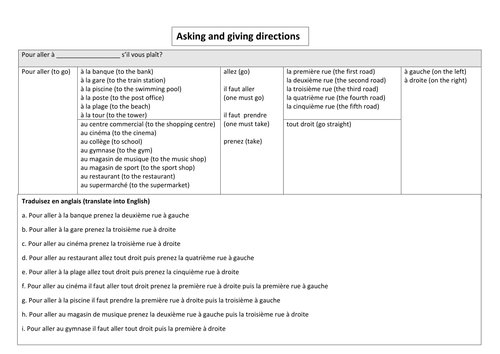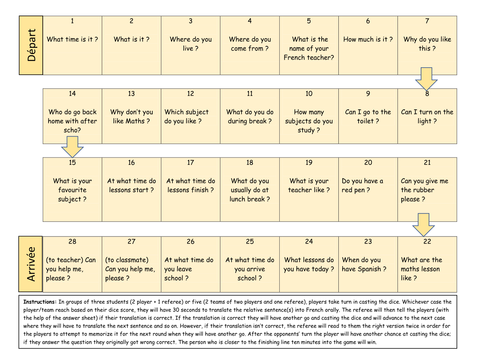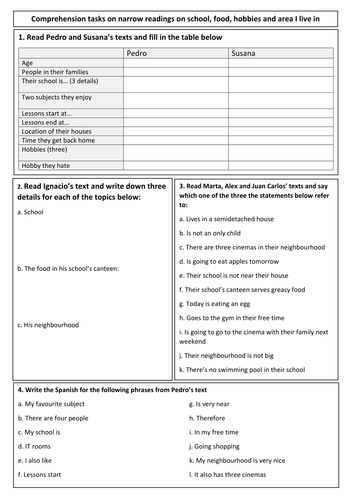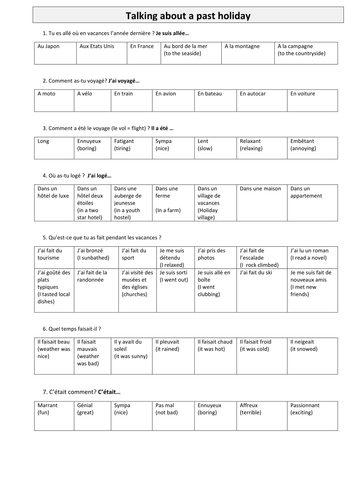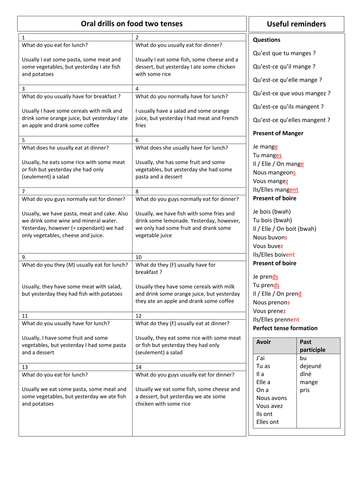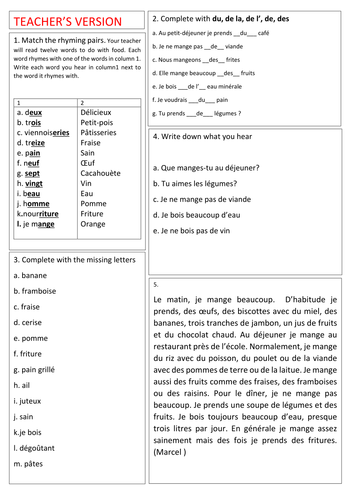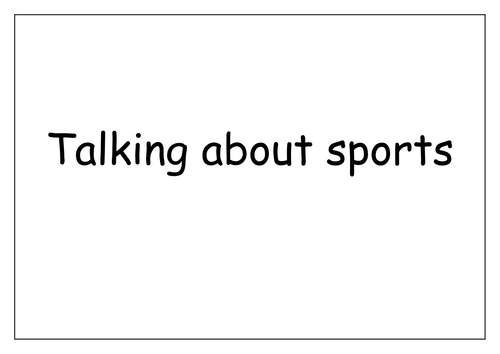
383Uploads
3148k+Views
5744k+Downloads
All resources

KS3/4 French - Pool of resources on "je me présente" (general personal details)
Three files, all recycling exactly the same vocabulary and patterns:
1. Three narrow reading texts a la Conti with a range of comprehension and an oral task.
2. An oral translation board game from French to English to do after 1
3. A gap fill task
4. An oral scaffold on the topic recycling all of the above
5. An oral translation board game from English to French

KS3/4 Spanish - Talking about a past holiday pool of resources (reading, speaking, writing)
Three narrow reading texts on talking about holidays with a number of tasks aimed at maximising exposure to the target vocabulary and structures
3 files :
1. Narrow reading texts with three tasks on them
2. Same texts have been gapped and missing words/chunks provided in random order
3. Written and oral work - or simply oral work
4. Oral translation board game
5. Oral scaffold

KS3-4 French - Collection of 11 oral translation board games on various topics / grammar structures
ANSWER KEY FOR EACH GAME PROVIDED
Instructions: In groups of three students (2 player + 1 referee) or five (2 teams of two players and one referee), players take turn in casting the dice. Whichever case the player/team reach based on their dice score, they will have 30 seconds to translate the relative sentence(s) into French orally. The referee will then tell the players (with the help of the answer sheet) if their translation is correct. If the translation is correct they will have another go and casting the dice and will advance to the next case where they will have to translate the next sentence and so on. However, if their translation isn’t correct, the referee will read to them the right version twice in order for the players to attempt to memorize it for the next round when they will have another go. After the opponents’ turn the player will have another chance at casting the dice; if they answer the question they originally got wrong correct. The person who is closer to the finishing line ten minutes into the game will win.
I do a round in writing (students write on miniwhiteboards or iPads) then one or two orally changing partners each time. Students love it but adequate prep essential.

KS4 French - Imperfect : oral translation board game with answer key
Instructions: In groups of three students (2 player + 1 referee) or five (2 teams of two players and one referee), players take turn in casting the dice. Whichever case the player/team reach based on their dice score, they will have 30 seconds to translate the relative sentence(s) into French orally. The referee will then tell the players (with the help of the answer sheet) if their translation is correct. If the translation is correct they will have another go and casting the dice and will advance to the next case where they will have to translate the next sentence and so on. However, if their translation isn’t correct, the referee will read to them the right version twice in order for the players to attempt to memorize it for the next round when they will have another go. After the opponents’ turn the player will have another chance at casting the dice; if they answer the question they originally got wrong correct. The person who is closer to the finishing line ten minutes into the game will win.
I do a round in writing (students write on miniwhiteboards or iPads) then one or two orally changing partners each time. Students love it but adequate prep essential.

KS3/4 French - Oral translation board game on Perfect tense of irregular verbs
Instructions: In groups of three students (2 player + 1 referee) or five (2 teams of two players and one referee), players take turn in casting the dice. Whichever case the player/team reach based on their dice score, they will have 30 seconds to translate the relative sentence(s) into French orally. The referee will then tell the players (with the help of the answer sheet) if their translation is correct. If the translation is correct they will have another go and casting the dice and will advance to the next case where they will have to translate the next sentence and so on. However, if their translation isn’t correct, the referee will read to them the right version twice in order for the players to attempt to memorize it for the next round when they will have another go. After the opponents’ turn the player will have another chance at casting the dice; if they answer the question they originally got wrong correct. The person who is closer to the finishing line ten minutes into the game will win.
I do a round in writing (students write on miniwhiteboards or iPads) then one or two orally changing partners each time. Students love it but adequate prep essential.

KS2/3 French - Oral translation board game on French basics (personal info)
Instructions: In groups of three students (2 player + 1 referee) or five (2 teams of two players and one referee), players take turn in casting the dice. Whichever case the player/team reach based on their dice score, they will have 30 seconds to translate the relative sentence(s) into French orally. The referee will then tell the players (with the help of the answer sheet) if their translation is correct. If the translation is correct they will have another go and casting the dice and will advance to the next case where they will have to translate the next sentence and so on. However, if their translation isn’t correct, the referee will read to them the right version twice in order for the players to attempt to memorize it for the next round when they will have another go. After the opponents’ turn the player will have another chance at casting the dice; if they answer the question they originally got wrong correct. The person who is closer to the finishing line ten minutes into the game will win.
I do a round of written transl and one of oral changing partners

KS3/4 French - Oral or Written translation board game on character description with answer key
Instructions: In groups of three students (2 player + 1 referee) or five (2 teams of two players and one referee), players take turn in casting the dice. Whichever case the player/team reach based on their dice score, they will have 30 seconds to translate the relative sentence(s) into French orally. The referee will then tell the players (with the help of the answer sheet) if their translation is correct. If the translation is correct they will have another go and casting the dice and will advance to the next case where they will have to translate the next sentence and so on. However, if their translation isn’t correct, the referee will read to them the right version twice in order for the players to attempt to memorize it for the next round when they will have another go. After the opponents’ turn the player will have another chance at casting the dice; if they answer the question they originally got wrong correct. The person who is closer to the finishing line ten minutes into the game will win.
I do a round in writing (students write on miniwhiteboards or iPads) then one or two orally changing partners each time. Students love it but adequate prep essential.

Year 7/8 French - Narrow reading tasks on general description
Three narrow reading texts exploited through 4 different narrow reading tasks

Year 7 French - Narrow readings on 5 different topics
Narrow reading texts exploited through 'bad translation', 'spot the differences' and other techniques. Ideal for beginners on:
- hobbies
- general description
- morning routine
- adjectives (personality)
- sports
To find out more on this technique click here : https://gianfrancoconti.wordpress.com/2017/07/22/eight-narrow-reading-techniques-that-will-enhance-your-students-vocabulary-and-reading-skills/

Year 7 French - Talking about school (receptive work: listening and reading)
A sentence builder to present the vocab (subjects, opinions, things one does around school) and a few receptive tasks to recycle it through listening and reading

Beginner French - Directions / Places in town (sentence builder, vocab builder, microlistening)
A sentence builder, a map for oral pairwork, a vocab builder and a micro-listening skills set of activities

Year 7 / 8 French - Oral ping-pong translation game (pair-work)
INSTRUCTIONS - The students work in pairs. They have a sheet with the same English sentences to translate into French, but Partner A has the translation of sentences 1 to10, whereas Partner B has the translation of sentences 11 to 20.
I call it 'Oral ping-pong translation' because they do it orally, Partner A challenging Partner B with a sentence and showing the correct answer to provide them with feedback and to award points (3 for perfect sentence, 2 for one mistake only, 1 if there are mistakes but at least the verb is correctly formed). I give them a time limit (10 minutes); when the time is up the person with the higher score wins. Best to have people of similar ability in each pair. Here is an example: I made for a very able year 11 of mine. Obviously the activity can be done in writing too.
As a follow-up, I get the students to make a note of the most serious mistakes they made in their books so that I have an idea of what their problem areas are. Differentiation opportunities are obvious: different sets of sheets for groups of different ability

Year 7 / 8 French - Oral translation board game
Instructions: In groups of three students (2 player + 1 referee) or five (2 teams of two players and one referee), players take turn in casting the dice. Whichever case the player/team reach based on their dice score, they will have 30 seconds to translate the relative sentence(s) into French orally. The referee will then tell the players (with the help of the answer sheet) if their translation is correct. If the translation is correct they will have another go and casting the dice and will advance to the next case where they will have to translate the next sentence and so on. However, if their translation isn’t correct, the referee will read to them the right version twice in order for the players to attempt to memorize it for the next round when they will have another go. After the opponents’ turn the player will have another chance at casting the dice; if they answer the question they originally got wrong correct. The person who is closer to the finishing line ten minutes into the game will win.

Year 7 / 8 French - Oral board game on high-frequency school-related phrases
Instructions: In groups of three students (2 player + 1 referee) or five (2 teams of two players and one referee), players take turn in casting the dice. Whichever case the player/team reach based on their dice score, they will have 30 seconds to translate the relative sentence(s) into French orally. The referee will then tell the players (with the help of the answer sheet) if their translation is correct. If the translation is correct they will have another go and casting the dice and will advance to the next case where they will have to translate the next sentence and so on. However, if their translation isn’t correct, the referee will read to them the right version twice in order for the players to attempt to memorize it for the next round when they will have another go. After the opponents’ turn the player will have another chance at casting the dice; if they answer the question they originally got wrong correct. The person who is closer to the finishing line ten minutes into the game will win.

Year 7 Spanish - Narrow reading texts with comprehension tasks across topics for EOY revision
Suitable for year 7 end-of-year revision. Six narrow reading texts recycling family, school, hobbies, food and area I live in (IN PRESENT TENSE ONLY) . Lots of high frequency vocabulary.
Texts were designed in such a way as to contain highly patterned input, with lots of repetitions and contextual cues.
Comprehension questions are on separate sheet and are designed to practise a range of reading micro-skills.

KS3/4 French - Holidays (sentence builder, narrow reading, oral scaffold, vocab builder,etc.)
Listening-as-modelling (sentence builder), Speaking, Reading and Vocab building activities

KS3 French - Sentence builder on food, narrow reading and oral drills (two tenses)
(1) A sentence builder modelling the use of two sentences (perfect tense and present tense) to say when and what you eat/ate with present and past time markers
(2) A set of oral drills with scaffold aside, to practise the material in the sentence builder orally
(3) narrow reading texts recycling the same chunks of language
(4) a vocab consolidation sheet

2017 KS3 French resources - Food (lstening, speaking, reading and translation)
New pool of resources on food, twelve to be exact

KS3/4 French - Irregular Perfect tense (sentence builder, translation and drills)
Typical Cont-style resources on the Irregular perfect tense

KS3 French - Booklet on sport (part 1)
First part of a booklet on talking about leisure in the present tense. 14 pages of activities including sentence builders, narrow reading, oral communicative drills and lots more drilling in jouer a / faire du + sport .
Vocab includes a wide range of nouns and adjectives, recycled and drilled in over and over again throughout the booklet across all four skills.

